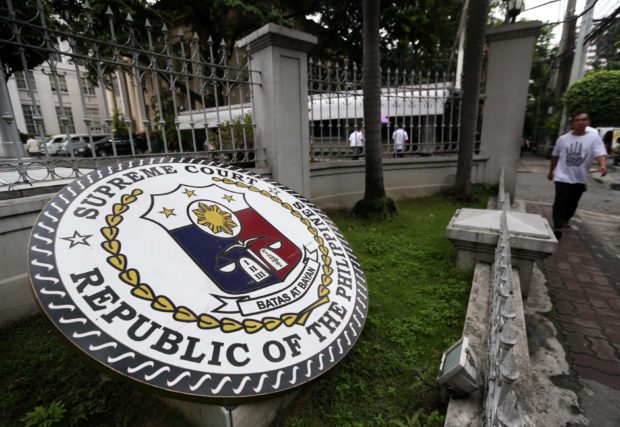
The Supreme Court symbol in Manila. (File photo LYN RILLON / Philippine Daily Inquirer)
You may get in but you cannot get out of the government’s list of drug personalities once you have been reported to barangay officials.
Human rights advocates made this point on Tuesday before the Supreme Court during Tuesday’s oral arguments on a petition questioning the constitutionality of the government’s war on drugs.
Petitioners want the high court to declare as unconstitutional two memorandum circulars – Command Memorandum Circular (CMC) 16-2016 of the Philippine National Police (PNP) that gives life to “Project: Double Barrel,” which is the Duterte administration’s war on drugs, and Memorandum Circular 2017-112 of the Department of the Interior and Local Government (DILG) that created a system of anonymous reporting of suspected criminals.
“There is a list generated for purposes of this program called ‘Tokhang.’ Is it easy to get into the list?” Associate Justice Marvic Leonen asked the petitioners.
Lawyer Joel Butuyan said yes.
“All you need is somebody telling on you,” Leonen said, asking if there is some level of investigation to validate the names on the list.
Butuyan said the validation was only “in papers.”
“How does one get out of the list?” Leonen asked.
Butuyan said there was no provision in the CMC to follow that would enable a person to get out of the list.
“In other words, the CMC circular, the DILG and police manuals have no provision in order for one person who is in the list to actually know that they are in the list and actually have their names removed,” Leonen added.
Butuyan, who represents families of 35 victims of anti-drug operations carried out by the Manila Police District Station 6 at San Andres Bukid said their clients tried to get their names removed from the list. But they were not entertained by the police.
“The police are not allowing them,” Butuyan said.
“You mean there is no administrative procedure for getting your name off a list that says ‘drug suspect’?” Leonen asked.
“There is none,” Butuyan said.
During the course of the oral arguments, rights – such as right to be presumed innocent until proven guilty, right to privacy, right against illegal search and seizure, right against self incrimination – came up with the implementation of “Project: Double Barrel,” of which Tokhang is a part.
READ: Violation of citizens privacy, others under ‘Tokhang’ tackled
READ: Leonen: Forcing drug suspects to open door to cops violates Anti-Torture Law
Leonen said being labeled by friends or family would be understandable because it is normal in a society.
However, he said if one would be labeled as a “drug personality” under the government’s watchlist, one could be labeled a “dangerous creature” without any opportunity to correct it.
“When it is done by the government, would you say that there is a fundamental right violated?” Leonen asked.
Butuyan replied that the right violated would be the presumption of innocence until proven guilty.
Leonen added that the respect for human dignity, which is also enshrined in the constitution, would also be also violated.
“Giving a mistaken label without a procedure for that to stick can be a dangerous thing,” he said, saying that it would damage a person’s reputation.
During the oral arguments, the court also questioned the discrepancy in the numbers of victims on the war on drugs. The PNP put the figure at 3,800 death under legitimate operations and almost 2,500 deaths under investigation. But independent groups put the number of victims at more than 10,000.
Oral arguments will resume next Tuesday, Nov. 28, with Solicitor General Jose Calida arguing for the government.
The court also summoned Director General Ronald “Bato” dela Rosa, PNP chief, and other key players in the war on drugs for next week’s hearing.